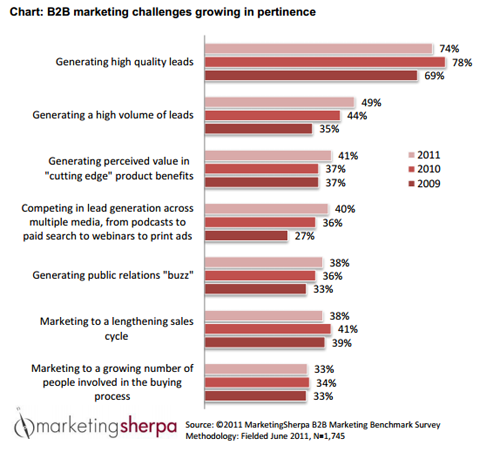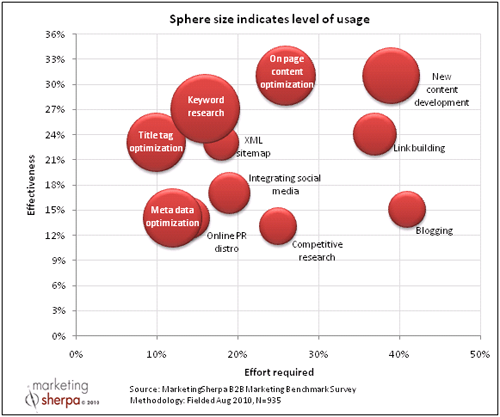Concepts Every B2B SEO Needs To Know In Today’s Internet Marketing Environment
In a recent Forbes article, the popular SEO is Dead / Death of SEO topic took center stage. The article highlighted how questionable SEO tactics (particularly for link building) will no longer be valid. Marketers need to focus on creating truly great content, which in turn earns the right to be shared and searched for. The […]
In a recent Forbes article, the popular SEO is Dead / Death of SEO topic took center stage. The article highlighted how questionable SEO tactics (particularly for link building) will no longer be valid. Marketers need to focus on creating truly great content, which in turn earns the right to be shared and searched for.
The problem with the article’s hypothesis was that it was based on an assumption that SEO tactics only use shortcuts for success. My perspective is that SEO is more than a series of shortcuts, but an evolving Internet marketing discipline.
Regardless of what perspective you hold, one thing is true: B2B SEO requires greater integration with multiple marketing specialties. This is particularly true when working with larger organizations.
If you are responsible for SEO in your organization and hearing the chatter about its death, it is critical to understand the concepts and priorities various marketing teams hold important. Talk their talk.
Here are five concepts (and applicable supporting concepts) B2B search engine marketers should understand with regards to strategic marketing initiatives, and why they are important.
Conversion Rate Optimization
Conversion rate optimization (CRO) is the practice of creating, implementing, and evaluating facets of a webpage or website in an effort to increase the number and/or percentage of visitors that complete designated actions (such as form submissions, purchases, etc).
Why conversion rate optimization is important for B2B SEO
According to MarketingSherpa’s 2012 B2B Marketing Benchmark Report generating high quality leads and generating a greater volume of leads are the two highest priorities for B2B marketing departments. We cannot forget this.
What is fortunate is that the search community has been expressing the value of CRO for quite some time. Search Engine Land’s Search & Conversion columnists share their expertise week after week; in addition, SEOmoz has a great guide on conversion rate optimization worth reviewing.
Lead Management
In an interview with Ed Hadley, Senior Marketing Manager at Neolane, Ed defined lead management as a set of processes and technologies that help B2B marketers optimize demand generation and move potential customers down the funnel.
Ed highlighted four main steps in a lead management process:
- Lead Capture – the specific conversion initiative, such as filling out a lead form to download a white paper.
- Lead Scoring – a method of assigning points to prospects and sending them to the right marketing channels appropriately.
- Lead Routing – ensuring that the sales team is pursuing the most winnable opportunities.
- Nurturing – Leads that are not qualified enough for sales are funneled into nurture programs (more on this in the next section).
Why lead management is important for B2B SEO
The understanding of a lead management process helps B2B SEO’s establish greater clarity in developing tactical initiatives, because not all leads are created equal. Expectations to leadership, on the results of lead acquisition from a B2B program, can in turn be set across multiple levels of quality and volume.
Lead Nurturing
I spoke with Eloqua VP of Content Marketing Joe Chernov a while back on his thoughts about lead nurturing: “Lead nurturing is about moving each of these visitors down the path to purchase.”
Basically, there is a significant percentage of website visitors not interested in an immediate purchase. Lead nurturing programs help build a trustworthy relationship between visitor and company; with the ultimate goal of making them a sales-ready prospect.
Why lead nurturing is important for B2B SEO
Perhaps there is no such thing as a bad lead. Curiosity seekers, students, researchers, etc may become advocates for sales and more qualified lead opportunities, should the right lead nurturing campaigns be put in place to address this audience.
Establishing a better expectation for leads requiring greater emphasis on lead nurturing may be appropriate when considering the percentage of keyword queries associated to informational intent.
Content Curation
Rohit Bhargava defines content curation as “the act of finding, grouping, organizing or sharing the best and most relevant content on a specific issue.”
Per this MarketingSherpa report, the creation of new content is one of the most effective B2B SEO tactics but also requires some of the greatest levels of effort.
Content curation strategy offers another tool for content development and link acquisition. Specific content curation features more SEO friendly include more easier-to-enable keyword landing pages and social media functionality built-in.
Why content curation is important for B2B SEO
One of the biggest stumbling blocks B2B SEO’s face is the ability to generate unique content. Content curation can become an easier jumping off point for establishing industry expertise and developing valuable assets for keyword visibility.
The Concept Of Converged Media
The Altimeter Group’s report “The Converged Media Imperative,” defines converged media represents the utilization of two or more channels (paid, owned, and earned media) working in concert and enabling brands to reach their target audience regardless of channel, medium, or device.
- Paid media is classified as display or broadcast advertising (Google AdWords, Facebook Ads, etc.)
- Owned media is content assets the company owns or controls (websites, blogs, etc.)
- Earned media is user-generated content created and/or shared by users (shares, organic reviews, etc.)
Why this is important for B2B SEO
It is critical for search engine marketers to keep up with emerging trends and concepts, particularly those that benefit SEO. In the case of converged media, Altimeter research supports the hypothesis that collaborative efforts throughout media channels will be the future of a successful marketing initiative.
This is a boon for an industry like SEO, which becomes more reliant on others for action and insight.
(Editor’s note: Search & Conversion columnist Scott Brinker has also covered the concept of converged media with respect to conversion rate optimization in his latest article, Framing Landing Pages In The Bigger Picture.)
Final Thoughts
The death of SEO is a truism if search engine marketers fail to understand the priorities and concepts important to the overall B2B marketing space.
You will be replaced with marketers who can tie SEO best practices into their existing competencies. Search engine marketing is a component (large and small) of the entire marketing mix.
What marketing concepts have you encountered which required greater learning and application? I would enjoy reading your perspective and feedback via comments below.
Contributing authors are invited to create content for Search Engine Land and are chosen for their expertise and contribution to the search community. Our contributors work under the oversight of the editorial staff and contributions are checked for quality and relevance to our readers. The opinions they express are their own.
Related stories
New on Search Engine Land


